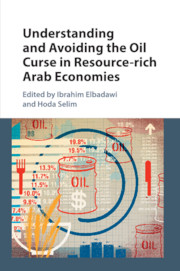Book contents
- Understanding and Avoiding the Oil Curse in Resource-rich Arab Economies
- Understanding and Avoiding the Oil Curse in Resource-rich Arab Economies
- Copyright page
- Contents
- Figures
- Tables
- Contributors
- Foreword
- Acknowledgments
- 1 Overview of Context, Issues and Summary
- 2 The Global Impact of the Systemic Economies and MENA Business Cycles1
- 3 Real Exchange Rates and Export Performance in Oil-dependent Arab Economies*
- 4 Dutch Disease in the Services Sector
- 5 The Political Economy of Public Sector Employment in Resource-dependent Countries1
- 6 The Oil Curse and Labor Markets
- 7 Resource Rents, Political Institutions and Economic Growth*
- 8 Fiscal Institutions in Resource-rich Economies
- 9 Savings and Investment Decisions from Natural Resource Revenues
- 10 Labor Market Heterogeneity and Optimal Exchange Rate Regimes in Resource-rich Arab Countries
- 11 The Institutional Curse of Natural Resources in the Arab World1
- 12 Has the UAE Escaped the Oil Curse?
- 13 Understanding and Avoiding the Oil Curse in Sudan
- Index
- References
2 - The Global Impact of the Systemic Economies and MENA Business Cycles1
Published online by Cambridge University Press: 05 July 2016
- Understanding and Avoiding the Oil Curse in Resource-rich Arab Economies
- Understanding and Avoiding the Oil Curse in Resource-rich Arab Economies
- Copyright page
- Contents
- Figures
- Tables
- Contributors
- Foreword
- Acknowledgments
- 1 Overview of Context, Issues and Summary
- 2 The Global Impact of the Systemic Economies and MENA Business Cycles1
- 3 Real Exchange Rates and Export Performance in Oil-dependent Arab Economies*
- 4 Dutch Disease in the Services Sector
- 5 The Political Economy of Public Sector Employment in Resource-dependent Countries1
- 6 The Oil Curse and Labor Markets
- 7 Resource Rents, Political Institutions and Economic Growth*
- 8 Fiscal Institutions in Resource-rich Economies
- 9 Savings and Investment Decisions from Natural Resource Revenues
- 10 Labor Market Heterogeneity and Optimal Exchange Rate Regimes in Resource-rich Arab Countries
- 11 The Institutional Curse of Natural Resources in the Arab World1
- 12 Has the UAE Escaped the Oil Curse?
- 13 Understanding and Avoiding the Oil Curse in Sudan
- Index
- References
Summary
This chapter analyzes spillovers from macroeconomic shocks in systemic economies (China, the Euro Area and the United States) to the Middle East and North Africa (MENA) region as well as outward spillovers from a GDP shock in the Gulf Cooperation Council (GCC) countries and MENA oil exporters to the rest of the world. This analysis is based on a global vector autoregression (GVAR) model, estimated for thirty-eight countries/regions over the period 1979Q2 to 2011Q2. Spillovers are transmitted across economies via trade, financial and commodity price linkages. The results show that the MENA countries are becoming more sensitive to developments in China than to shocks in the Euro Area or the United States, in line with the direction of evolving trade patterns and the emergence of China as a key driver of the global economy. Outward spillovers from the GCC region and MENA oil exporters are likely to be stronger in their immediate geographical proximity, but also have global implications.
- Type
- Chapter
- Information
- Publisher: Cambridge University PressPrint publication year: 2016
References
- 2
- Cited by



